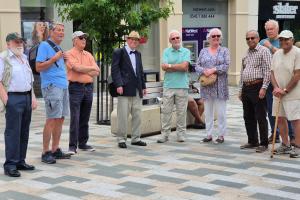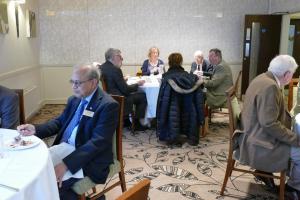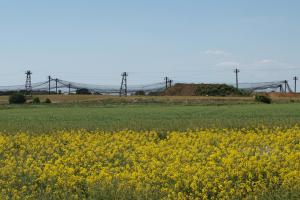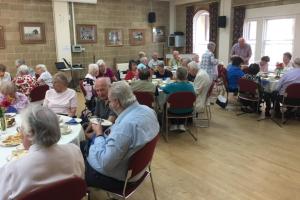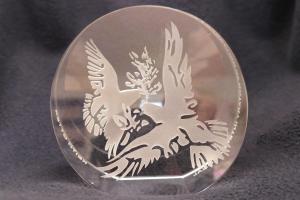Rtn Keith Otter: Battle of Maldon
Thu, Feb 10th 2022 at 12:45 pm - 2:45 pm
The most famous battle fought in Essex before the Conquest

Club member Keith Otter spoke to us about the Battle of Maldon, fought between the English and the Vikings in 991.
At the time England was ruled by the famously incompetent King Ethelred the Unready. A large Viking raiding party attacked the south coast, sacking Folkestone and Sandwich, and then sailed up the east coast to sack Ipswich. From there they sailed back down the coast and into the Blackwater Estuary, where the landed on Northey Island, about two miles from Maldon and 200 yards from the Estuary’s south bank. At high tide it was cut off but at low tide there was a causeway on which you could walk across.
By that time Bryhtnoth, the Earldormn of the East Saxons, had summoned his militia and assembled his forces on the south bank of the estuary, facing Northey Island.
 We have a detailed account of the ensuing battle, written not long afterwards in the form of an epic poem known as “The Battle of Maldon”. It tells the story entirely from the English point of view.
We have a detailed account of the ensuing battle, written not long afterwards in the form of an epic poem known as “The Battle of Maldon”. It tells the story entirely from the English point of view.
Bryhtnoth orders those of his men on horses to dismount and send their horses to a place of safety. Bryhtnoth then rides up and down his lines, encouraging his men and ordering their disposition. Then he dismounts and joins the men of his own household.
The Vikings send a spokesman forward to demand the English give them gold to go away. Bryhtnoth gets angry: “The only tribute you will get from us will be the points of spears and the edge of trusty swords.”
It is high tide by then. At low tide the Vikings start to cross the causeway and Bryhtnoth orders Wulfstan to defend it. Wulfstan is joined by two others and the three of them prevent the Vikings crossing.
When they realise they cannot force their way across, the Vikings ask for permission to cross and climb up on the bank - and Bryhtnoth very stupidly agrees! This may have been due to pride, overconfidence or taunts by the Vikings about the Englishmen’s reluctance to meet them in battle.
The English form a shield wall and a fierce battle commences, during which Bryhtnoth’s nephew is killed. Eventually Bryhtnoth himself is wounded by a spear thrown by one of the Vikings. One of those with Bryhtnoth, Wulfstan’s son Wulfmar, who has already been wounded himself, grabs the spear and throws it back, killing the Viking who threw it originally.
Bryhtnoth fights on until one of the Vikings smashes his right arm, which means he can no longer defend himself. Realising the inevitability of his death, Bryhtnoth offers a final prayer to God, part of which is quoted on the plinth of his statue in Maldon. Both Bryhtnoth and Wulfmar are killed.
Some of the English who have seen Bryhtnoth fall start fleeing. Godrich jumps on Bryhtnoth’s own horse and rides it away. Others on the English side, who have not seen Bryhtnoth fall, assume that it is Bryhtnoth himself fleeing the battle and they start to flee. The shield wall collapses.
At that point the remaining English realise they are doomed but determine to carry on. They are rallied by Aelfwin and others raise their voices in support, including Dunnere, a man from the ranks: “He who among this people would avenge his lord must weaken not nor care for life.”
The poet then names some of the English who fight valiantly on until they are killed themselves. These include Aesferth, “the hostage from Northumbria”. The description suggests that Aesferth was being held hostage by Bryhtnoth for some reason but still wanted to join his fellow Englishmen in fighting the Vikings.
Presumably Aelfwin himself is killed at some point as two brothers, Oswold and Eawold, take over the leadership. An elderly man called Bryhtwold encourages his fellows who are still fighting: “Mind must be harder, spirit must be bolder, and heart the greater as our might grows less.”
Another Godrich leads a charge - and that’s where the poem ends.
We know, though, that the English were utterly defeated. There are two accounts of what happened next:
- According to the chronicles kept by the monks of Ely Abbey, although they won the Vikings were so badly mauled themselves that they had no choice but to get back into their ships and sail home.
- According to King Ethelred’s court chronicle, he was forced to raise vast amounts of gold to buy them off.
You can decide which to believe.
 Contact Keith Otter about this page:
Contact Keith Otter about this page:
'What We Do' Main Pages:


